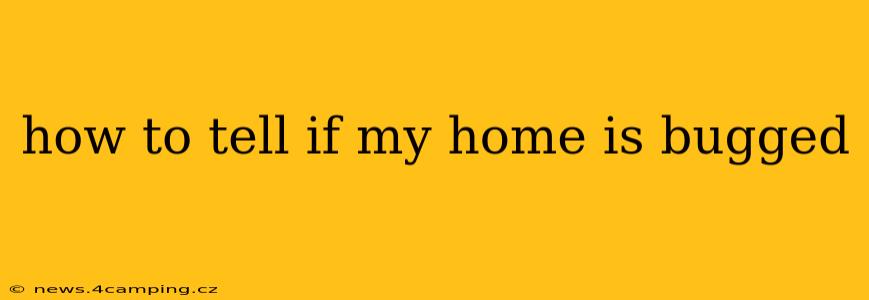Worried someone might be listening in? The feeling of your privacy being violated is unsettling, and the question of whether your home is bugged is a serious one. This guide will provide you with practical steps and insights to help you assess the situation. We'll explore common methods used for surveillance, how to detect them, and what actions to take if you suspect your privacy has been compromised.
What are the signs of a bugged home?
This is the most common question people ask when they suspect something is amiss. There are several telltale signs to look for, ranging from subtle anomalies to more obvious devices. Remember, not every unusual sound or occurrence indicates a bug; however, a combination of these signs warrants further investigation.
-
Unexplained noises: Do you hear unusual clicks, static, or buzzing sounds, especially when the phone isn't in use or when you're alone? This could indicate a hidden microphone picking up ambient sound.
-
Strange lights or flickering: Unusually bright or flickering lights, particularly around electrical outlets or fixtures, might signal the presence of a hidden camera.
-
Unusual activity on electronic devices: Unexpected app installations, abnormal data usage, or unfamiliar logins could indicate that your devices are compromised.
-
Loose or displaced objects: Finding furniture rearranged, drawers opened, or personal items moved without explanation might be a sign of someone gaining access to your home to install surveillance devices.
-
Suspicious individuals: Have you noticed unfamiliar faces lurking around your property or acting suspiciously?
How can I detect hidden cameras and microphones in my home?
Detecting hidden surveillance devices requires a systematic approach. Thankfully, several methods can help:
-
Visual inspection: Start by thoroughly examining your home, focusing on common hiding places like smoke detectors, clocks, picture frames, electrical outlets, and even everyday items like lamps or power adapters.
-
Use a bug detector: These devices are readily available online and in electronics stores. Bug detectors use a variety of technologies to detect radio frequencies emitted by hidden cameras and microphones. However, note that sophisticated bugs may not be detected by all bug detectors.
-
Check for unusual wiring or connections: Look for wires or cables that don't seem to connect to anything obvious. This could indicate a hidden camera or microphone.
-
Use your smartphone: Many smartphones have built-in tools that can detect nearby Wi-Fi networks. A strong signal from an unknown network in your home could suggest a wireless camera or microphone.
-
RF detection apps: Numerous smartphone apps are designed to detect radio frequencies, potentially helping identify hidden devices.
How do I find hidden bugs in walls?
Locating bugs within walls presents a greater challenge. While a thorough visual inspection of accessible areas is always recommended, identifying bugs concealed within walls typically requires specialized tools and expertise. If you suspect this, consider contacting a professional security expert.
What should I do if I find a bug in my home?
Discovering a hidden surveillance device is a serious matter. The following actions are crucial:
-
Do not touch or remove the device: Preserve evidence by leaving it undisturbed. Contacting law enforcement is recommended to ensure proper handling and investigation.
-
Document everything: Take photos or videos of the device, its location, and any surrounding evidence. Note the date, time, and any other relevant details.
-
Contact the authorities: File a police report. They are equipped to handle such situations and can investigate the source of the surveillance.
-
Consult with a security professional: A professional can assess your home's security and recommend measures to prevent future intrusions.
Can I use a phone app to detect hidden cameras?
Yes, several smartphone apps claim to detect hidden cameras. These apps often leverage the phone's camera and sensors to identify infrared radiation emitted by some hidden cameras. However, the reliability of these apps can vary, and they may not detect all types of hidden cameras. Using an app in conjunction with a thorough visual inspection is a prudent strategy.
Is it legal to bug someone's house?
Absolutely not. Bugging someone's house without their consent is a serious crime, violating privacy laws and potentially incurring significant legal penalties. Any surveillance conducted within a home without the knowledge and consent of the occupants is illegal in most jurisdictions.
By combining careful observation, technological tools, and proactive measures, you can significantly reduce the risk of being subjected to unwanted surveillance. Remember, protecting your privacy is crucial, and taking the necessary steps to safeguard your home is an investment in your peace of mind. If you have concerns, don't hesitate to seek professional assistance.
